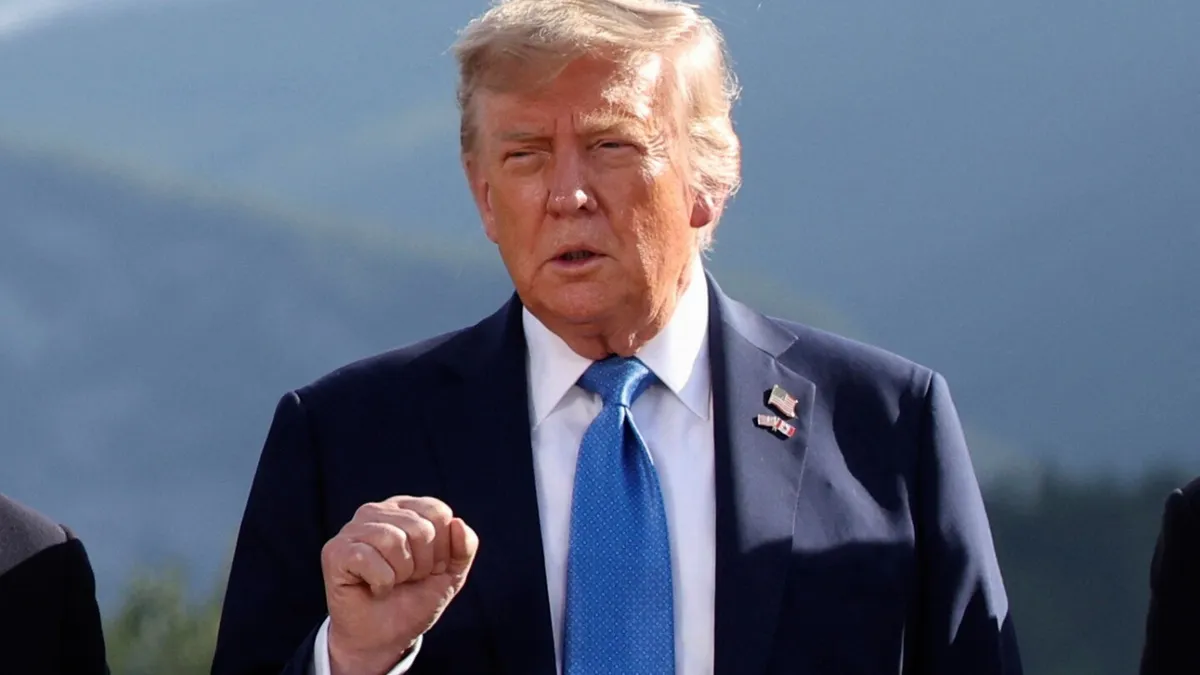
President Donald Trump made a significant shift in his stance regarding Iran during a recent international summit, underscoring the escalating tensions in the region. Within just eight hours on Monday, Trump transitioned from indicating that a nuclear deal with Iran was still “achievable” to advising the 9.5 million residents of Tehran to evacuate for their safety. This abrupt change in tone coincided with his decision to cut short his participation in the Group of Seven (G7) summit in the Canadian Rockies, returning to Washington for urgent discussions with his national security team.
As Trump prepared to arrive back at the White House early Tuesday, the situation in the Middle East was rapidly evolving. Israel has conducted four days of intense missile strikes against Iran, causing significant damage and aiming to deliver a decisive blow to Tehran’s nuclear ambitions. Israeli officials believe that with additional support from Trump, they could achieve their goal of crippling Iran’s nuclear program. However, the prospect of increasing American military involvement, such as supplying bunker-busting bombs to penetrate deeply buried Iranian nuclear sites, carries substantial political risks for the President.
In a social media post made shortly before his departure from the summit, Trump expressed frustration over Iran's failure to sign a proposed deal, stating, “What a shame, and waste of human life. Simply stated, IRAN CAN NOT HAVE A NUCLEAR WEAPON. I said it over and over again! Everyone should immediately evacuate Tehran!” This message was part of a broader strategy as the U.S. repositioned warships and military aircraft in the region in preparation for potential conflict escalation.
Israeli Prime Minister Benjamin Netanyahu has declared that the bombardment will persist until Iran's nuclear capabilities and ballistic missile programs are dismantled. Despite targeting various Iranian nuclear sites, Israeli forces have yet to neutralize the heavily fortified Fordo uranium enrichment facility, which may require U.S. assistance in the form of the 30,000-pound GBU-57 Massive Ordnance Penetrator. This advanced bomb is designed to penetrate deep underground targets and explode, but Israel currently lacks both the munition and the necessary B-2 stealth bombers for its delivery.
Following the announcement of Trump's return to Washington, Defense Secretary Pete Hegseth made a notable appearance on Fox News, fueling speculation about a potential shift towards more direct U.S. involvement in the conflict. Hegseth affirmed, “Of course” Trump desires a deal to curtail Iran's nuclear program, emphasizing a strategy of “peace through strength” while highlighting America's defensive posture in the region.
During a sideline conversation with reporters at the G7, Trump reiterated his call for Iran to engage in negotiations regarding its nuclear program, stating, “They should talk, and they should talk immediately.” Despite the chaos, he has tried to exercise restraint over Israeli military actions, particularly rejecting a proposal to target Iran’s Supreme Leader, Ayatollah Ali Khamenei, due to the potential for further escalation.
Trump's stance on Iran has sparked a division among his supporters, including notable conservative figures such as Tucker Carlson, who has criticized any increase in U.S. military involvement as a betrayal of Trump's promise to end foreign wars. Trump, unfazed by the backlash, responded to Carlson’s remarks by suggesting he should create his own television network to share his views. This schism highlights a broader concern among Trump’s base regarding the extent of U.S. engagement in foreign conflicts.
Conversely, some of Trump’s allies, including Senator Lindsey Graham, argue that this is an opportunity for Trump to decisively address Iran's nuclear threat. Graham has publicly encouraged Trump to fully support Israel and dismantle Iran's nuclear program, asserting that effective peace requires cooperation from all parties involved.
As the situation continues to unfold, the balance between diplomatic negotiations and military strategy remains a critical aspect of Trump's foreign policy approach to Iran. The coming days may prove pivotal in determining the future of U.S.-Iran relations and the broader geopolitical landscape in the Middle East.